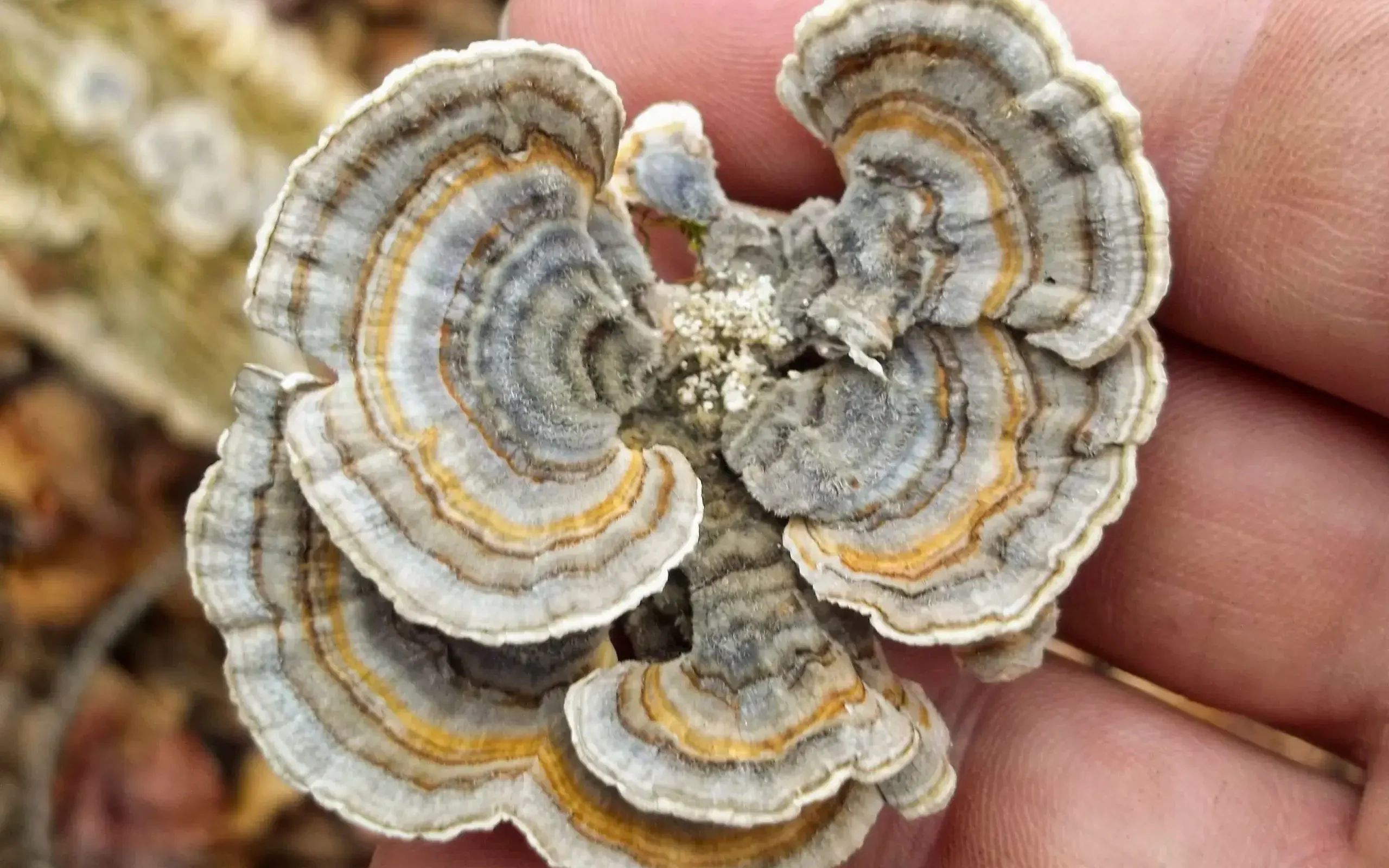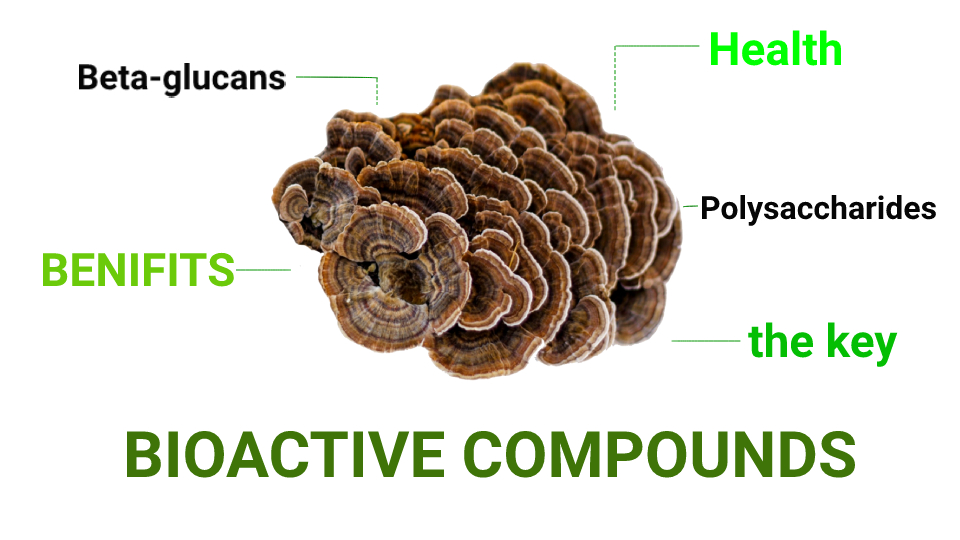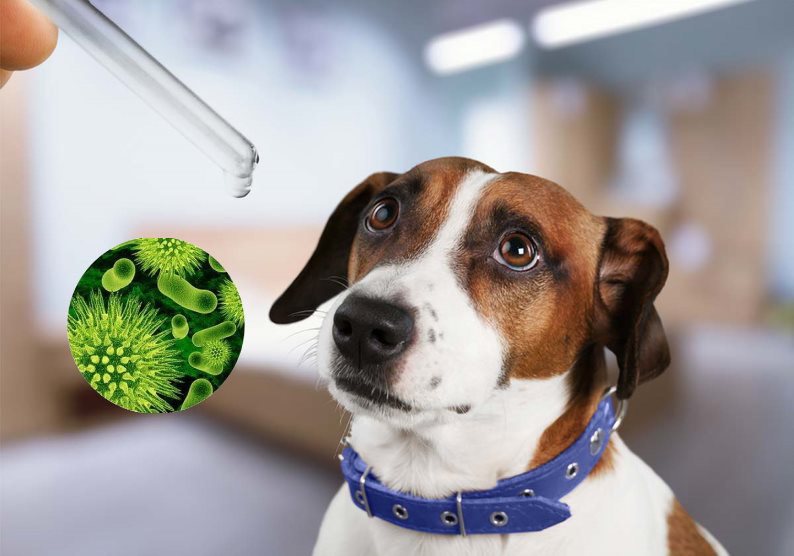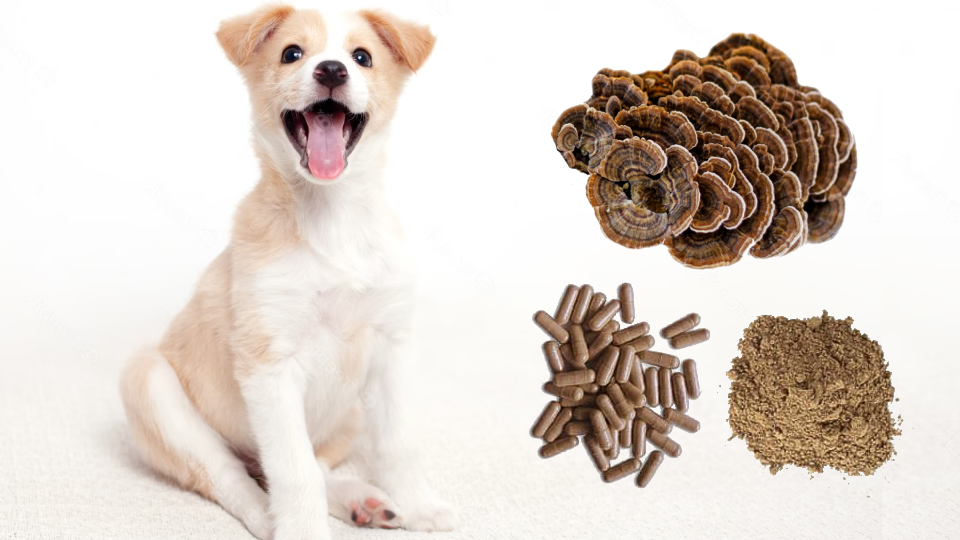Turkey Tail Mushroom for Dogs: Top Benefits and Consideration
Turkey tail mushroom has gained popularity as a natural supplement for dogs, offering various health benefits. This type of fungi, traditionally used by humans, is known for its immune-boosting properties. It can address issues like infections, immune deficiencies, and malignant cell growth. Many veterinarians believe that the same benefits and safety experienced by humans can extend to our pets’ health and well-being.
In this article, we’ll explore the health benefits of Turkey Tail Mushroom for Dogs and its versatile applications as a safe and natural pet care supplement.
In this article:
What Are Turkey Tail Mushrooms?
Turkey Tail mushrooms, scientifically known as Trametes versicolor, grow in both subtropical and temperate climates worldwide. They have fan-shaped caps and vivid colors, and can commonly be found on dead logs, stumps, and other decaying woody materials. These mushrooms are a rich source of vitamins, minerals, and antioxidant compounds that offer several benefits.

Dogs can benefit from Turkey Tail mushrooms, especially in boosting their immune system. Studies reveal that polysaccharides present in the mushrooms stimulate white blood cell production, which defends the body against infections and diseases. The mushrooms also contain anti-inflammatory compounds that can reduce inflammation and improve joint health in dogs[1].
Turkey Tail mushrooms are also rich in dietary fiber, which promotes digestion and regulates nutrient absorption. Animal studies have shown that these mushrooms have anti-tumor effects, which could help reduce the risk of certain cancers in dogs.
Overall, Turkey Tail mushrooms provide numerous health benefits to dogs, making them an excellent natural food source that ensures your furry friend remains healthy and happy.
What Makes Turkey Tail Mushrooms Protective for Your Dogs?

Turkey Tail mushrooms are a popular supplement for dogs as they have immune-boosting properties. Beta-glucans, complex polysaccharides, are the main bioactive compounds responsible for this effect. These activate immune cells such as macrophages and natural killer cells to recognize and fight off things like viruses, bacteria, and cancer cells. They also reduce inflammation and promote tissue repair.
These beta-glucans found in Turkey Tail mushrooms are especially effective in stimulating the immune system. They act as “pathogen-associated molecular patterns” that are detected by immune cells as foreign and trigger a response. Thus, they are a protective supplement for dogs with weakened immune systems due to age, illness, or stress. The antioxidants in Turkey Tail mushrooms also help to reduce oxidative stress and promote general health.
Are Turkey Tail Mushrooms Safe for Dogs?
Turkey tail mushrooms are considered safe to add to your dog’s diet. These fungi contain beta-glucans, which are soluble fibers with essential sugars called PSK and PSP. These may help to boost your dog’s immune system, as well as benefit their heart, lungs, liver, and digestion.
Before introducing these mushrooms, it is important to source them from a reputable supplier and talk to your vet. This is especially important if your pup has any existing medical conditions or is taking medication, as some interactions may occur.
What Are Turkey Tail Mushroom Benefits for Dogs?
Dogs can benefit from the natural remedy of turkey tail mushrooms. This valuable resource has been known to support overall health and wellness. Incorporating this supplement into your pup’s diet can provide numerous advantages for them.
4 Incredible Health Benefits
1. Supporting Immune System
Turkey tail mushrooms can give your canine companion’s immune system a natural boost. These mushrooms contain polysaccharide-K (PSK) and polysaccharide-P (PSP), which make up their cell structures. Beta-glucans, also present in the mushrooms, trigger the production of vital immune cells, like macrophages, white blood cells, and T-cells. Adding turkey tail mushrooms to your pup’s diet can improve their resistance to illnesses and ailments. As a natural and safe alternative to medications and chemicals, these mushrooms provide your pet with the extra support they need for long-term health.
2. Possibility of Fighting Cancer
Studies suggest that Turkey Tail mushrooms may provide cancer-fighting benefits by reducing the growth and spread of cancer cells[2]. These mushrooms contain antioxidants and polysaccharides that can also help to reduce inflammation and provide additional support during cancer treatments. The antioxidants present in the mushrooms may even help protect cells from damage and inflammation, which are both risk factors for cancer. While studies have primarily been conducted on humans, there is reason to believe that dogs may also benefit from Turkey Tail mushrooms.
3. Can Help Fight Bacteria
Turkey Tail mushrooms are beneficial for dogs susceptible to bacterial infections, as they contain powerful antibacterial components[3]. These bioactive substances can inhibit the growth of dangerous bacteria, such as E. coli and Staphylococcus aureus, by interfering with their cellular processes. This natural antibacterial action can help to prevent infections and hasten the healing of existing ones. It is essential to remember that Turkey Tail mushrooms should not replace professional veterinary care in cases of infection. Adding these mushrooms to a dog’s diet may be an effective way to promote overall wellbeing and reduce the chance of bacterial infections.

4. Helps Digestive and Urinary Health
Turkey Tail mushrooms are a great source of natural prebiotics which can be beneficial for dogs. Prebiotics provide food for good bacteria in the gut, aiding digestion and nutrient absorption[4]. These prebiotics can also bolster the immune system, reducing the risk of infections and diseases. Furthermore, the antioxidants in Turkey Tail mushrooms reduce inflammation and oxidative stress in the urinary tract, helping to prevent and treat urinary tract issues.
Finding the Best Turkey Tail Supplement for Dogs
Selecting the ideal turkey tail supplement for your dog requires considering several factors. Here are some useful tips:
| Factor | Considerations |
|---|---|
| Reputable Company | Choose a company with a positive reputation for quality and safety that uses organic turkey tail mushrooms and transparently discloses its sourcing and manufacturing practices. |
| Ingredients | Look for a supplement that contains both the fruiting body and mycelium of the mushroom for maximum benefits. |
| Extraction Method | Choose a supplement labeled as “hot water extract” for maximum potency. |
| Additional Ingredients | Verify that any additional ingredients, such as probiotics or digestive enzymes, are safe for your dog. |
| Size and Weight | Follow recommended dosages based on your dog’s size and weight. |
| Growing Location | Ideally, turkey tail mushrooms should be grown in a clean environment, free from pollutants and heavy metals. Consider if they are grown in their natural habitat or cultivated for the supplement. |
Considering these factors can help you select a safe and effective turkey tail mushroom supplement for your furry friend.
Buying Turkey Tail Mushrooms for Your Dogs

Turkey Tail mushrooms have gained popularity as a natural supplement for dogs, thanks to their immune-boosting and antioxidant properties[5].
Best Practices When Purchasing
- Opt for Certified Organic and Non-GMO Products – Choose Turkey Tail mushrooms that are certified organic and non-GMO. This guarantees that the mushrooms were grown without using harmful pesticides or chemicals and that they do not contain genetically modified organisms. Organic and non-GMO products are generally of superior quality and provide better health benefits for your dog.
- Look for Fruiting Body Extract – Fruiting body extracts contain the highest concentration of beneficial compounds, making them the most effective part of the mushroom for supplements and extracts. Ensure that you’re getting the maximum health benefits by purchasing Turkey Tail mushrooms for your dogs that utilize a fruiting body extract.
- Consider Hot Water Extract – Hot water extraction is the most effective method of extracting beneficial compounds from Turkey Tail mushrooms. Choose products that use hot water extraction when buying Turkey Tail mushrooms for your dogs to ensure you’re getting a high-quality and effective supplement for your furry friend. Hot water extraction involves boiling the mushrooms in water to release the beneficial compounds, such as beta-glucans, into the water. The resulting liquid is then dried into a powder or made into a liquid extract.
Possible Side Effects for Dogs

Turkey tail mushrooms are considered safe for dogs, but there are potential side effects to be aware of. Below are the possible side effects associated with feeding your dog turkey tail mushrooms:
Common side effects:
- Digestive upset, such as vomiting or diarrhea
Uncommon side effects:
- Allergic reactions, such as hives or itching
- Lethargy or weakness
It is essential to follow the recommended dosing guidelines on the product label or consult with a veterinarian to avoid giving too much turkey tail mushroom to your dog, which can cause adverse effects.
If your dog shows any signs of discomfort or allergic reactions, stop giving them turkey tail mushrooms and seek advice from a veterinarian.
Other Beneficial Medicinal Mushrooms for Dogs

Giving your dog medicinal mushrooms is a great way to promote their overall health and well-being. Supplement forms, such as capsules or powders, are available, or you can add them to food as an ingredient. Turkey tail mushrooms are an excellent choice.
In addition to Turkey Tail mushrooms, there are other beneficial medicinal mushrooms for dogs. One such mushroom is Reishi, which supports the immune system and promotes overall wellness. Another mushroom is Shiitake, known for its antioxidant and anti-inflammatory properties that benefit the cardiovascular system. Lion’s Mane is another mushroom that supports cognitive function and can aid in nerve regeneration. By incorporating these medicinal mushrooms into your dog’s diet, you can provide natural and effective support for their health and well-being.
Safety and Considerations When Giving Your Dog Turkey Tail Mushrooms
Turkey tail mushrooms are a popular natural supplement that can offer many health benefits to dogs, including boosting their immune system and fighting off cancer[6]. However, it’s important to keep safety considerations in mind when giving your dog turkey tail mushrooms.
Key Points to Consider Before Giving Turkey Tail to Your Dogs
Turkey Tail Dosage for Dogs
The dosage of turkey tail mushrooms for your dogs varies depending on their size, health, and individual needs. To be safe, it is best to consult a veterinarian before administering any new supplement. Generally, a dosage of 100-200mg per 10 pounds of body weight is recommended daily. Monitor your pooch for any adverse reactions, such as diarrhea or vomiting, which may indicate an overdose. Bear in mind that research results may not apply to all supplements.
Turkey Tail Dosage for Cancer for Dogs
Research suggests that turkey tail mushrooms could be helpful for dogs with cancer. According to a 2013 study in the Journal of Veterinary Medical Science, dogs with hemangiosarcoma had improved survival rates and reduced metastasis when given daily doses of turkey tail mushroom extract. Another 2012 study in the Journal of the American Animal Hospital Association found that combining turkey tail mushrooms with chemotherapy led to longer survival times in dogs with hemangiosarcoma compared to chemotherapy alone[7]. The appropriate dosage may vary depending on the dog’s size, health condition, and other factors.
Some veterinarians may recommend incorporating turkey tail mushroom supplements into cancer treatment plans, but it’s important to consult with a veterinarian before starting any new supplement regimen.
Turkey Tail Mushrooms for Pregnant or Nursing Dogs

Although no studies have investigated the effects of turkey tail mushrooms during pregnancy or lactation in dogs, some studies in humans suggest that the polysaccharides in these mushrooms could affect hormone levels and potentially trigger contractions in pregnant women.
Therefore, it’s generally advised to avoid giving turkey tail mushroom supplements to pregnant or nursing dogs unless specifically directed to do so by a veterinarian. If a veterinarian does recommend using these mushrooms, they may adjust the dosage or frequency of administration to minimize any potential risks to both the mother and her offspring.
It’s important to closely monitor the dog for any adverse reactions or changes in behavior, as with any supplement.
Medication Interactions with Turkey Tail Mushrooms in Dogs
Before giving turkey tail mushrooms to your dog, make sure to inform your veterinarian about any current medications your furry friend is taking as they may interact with certain drugs. This is especially important if your dog is taking medication for a chronic condition or blood-thinning medication, as turkey tail mushrooms can also have a mild blood-thinning effect. As with any supplement, keep a close eye on your dog for any adverse reactions or changes in behavior.
FAQs
What Does Turkey Tail Mushroom Do for Dogs?
Turkey Tail mushrooms for dogs are believed to offer potential benefits like immune system support, improved digestion, and enhanced overall well-being. They contain compounds that may help the body fight off illnesses and maintain good health. However, individual responses can vary, so consult with a veterinarian for guidance on its use for your pet.
Does Turkey Tail Mushroom Help with Cancer in Dogs?
Turkey Tail mushrooms have shown promise in supporting the immune system and potentially complementing cancer treatment for dogs. They may help improve quality of life and overall well-being. However, they are not a standalone cancer treatment and it’s crucial to consult a veterinarian for a comprehensive treatment plan tailored to your dog’s specific needs.
Will Turkey Tail Mushrooms Interfere with Other Medication My Dog May Need?
Turkey Tail mushrooms for dogs should be used with caution, especially if your dog is on medication. Consult a veterinarian before giving any supplements to your pet. Turkey Tail may interact with certain medications, so professional guidance is crucial to ensure your dog’s safety and well-being.
How Long Will Turkey Tail Mushrooms Take to Work for Dogs?
The time it takes for Turkey Tail mushrooms to work for dogs varies. Some dogs may show improvements in a few weeks, while others may take longer. It depends on factors like the dog’s health, the condition being treated, and the dosage used. Consistency in administration is key to potential benefits. Consult a veterinarian for guidance.
When Can I Quit Giving Turkey Tail Mushrooms to My Dog?
The duration of giving Turkey Tail mushrooms to your dog should be determined by a veterinarian based on the specific health condition being addressed. It’s essential to follow their recommendations and not stop treatment abruptly to ensure the best results for your pet’s well-being. Always consult a professional for guidance.
How Much Turkey Tail Mushroom Should I Give My Dog?
The appropriate Turkey Tail mushroom dosage for your dog varies based on factors like weight, health condition, and product concentration. Always consult a veterinarian for personalized guidance. In general, a common guideline is around 100-200 milligrams per 10 pounds of body weight, but this can vary, so professional advice is crucial.
Final Thoughts
Pet owners are turning to turkey tail mushrooms for their potential health benefits in boosting the immune system and fighting cancer. They have polysaccharides and beta-glucans that may aid in preventing diseases.
When choosing a turkey tail mushroom supplement, look for high-quality, organic, and non-GMO products. The recommended dosage varies based on the dog’s health and size, so consulting with a veterinarian is vital.
References
1. Polysaccharide-Peptide from Trametes versicolor: The Potential Medicine for Colorectal Cancer Treatment. Retrieved from https://www.researchgate.net/publication/365238685_Polysaccharide-Peptide_from_Trametes_versicolor_The_Potential_Medicine_for_Colorectal_Cancer_Treatment
2. β-Glucans from Trametes versicolor (L.) Lloyd Is Effective for Prevention of Influenza Virus Infection. Retrieved from https://www.researchgate.net/publication/358124492_b-Glucans_from_Trametes_versicolor_L_Lloyd_Is_Effective_for_Prevention_of_Influenza_Virus_Infection
3. Trametes versicolor extract modifies human fecal microbiota composition in vitro. Retrieved from https://pubmed.ncbi.nlm.nih.gov/23435630/
4. Evaluation of the anti-tumour activity of Coriolus versicolor polysaccharopeptide (I’m-Yunity) alone or in combination with doxorubicin for canine splenic hemangiosarcoma. Retrieved from https://onlinelibrary.wiley.com/doi/abs/10.1111/vco.12823
5. The mycelium of the Trametes versicolor (Turkey tail) mushroom and its fermented substrate each show potent and complementary immune activating properties in vitro. Retrieved from https://www.ncbi.nlm.nih.gov/pmc/articles/PMC6889544/
6. Polysaccharide-Peptide from Trametes versicolor: The Potential Medicine for Colorectal Cancer Treatment. Retrieved from https://www.researchgate.net/publication/365238685_Polysaccharide-Peptide_from_Trametes_versicolor_The_Potential_Medicine_for_Colorectal_Cancer_Treatment
7. Coriolus (Trametes) versicolor mushroom to reduce adverse effects from chemotherapy or radiotherapy in people with colorectal cancer. Retrieved from https://www.researchgate.net/publication/365843743_Coriolus_Trametes_versicolor_mushroom_to_reduce_adverse_effects_from_chemotherapy_or_radiotherapy_in_people_with_colorectal_cancer

